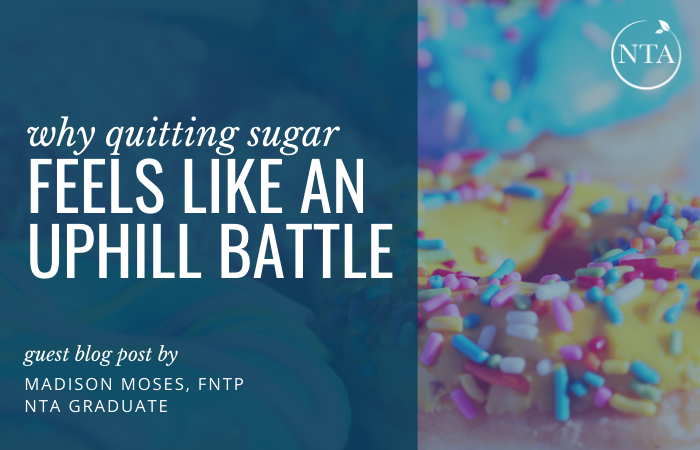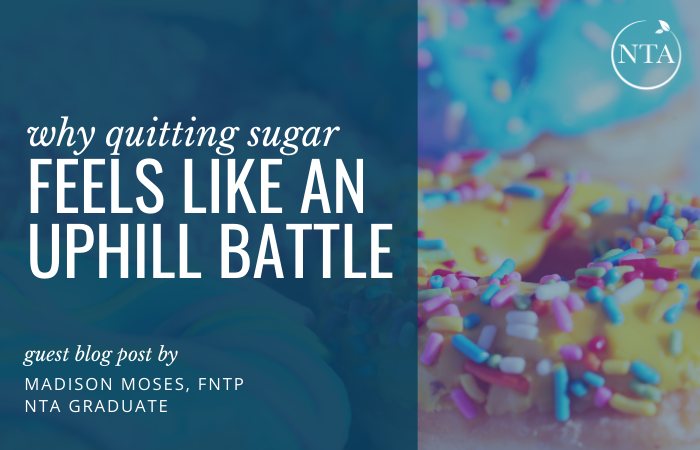
Why Quitting Sugar Feels Like an Uphill Battle
Blog
Why Quitting Sugar Feels Like an Uphill Battle

Have you ever tried to eat less processed sugar but couldn’t seem to do it on your own? Well, so have a lot of people. How you feel isn’t entirely your fault.
When we eat processed sugar, or any hyper-palatable food for that matter, the pleasure center in our brain triggers the release of dopamine, a neurotransmitter that creates a sense of wanting. In this case, it leaves us desiring more of the sugary food we are eating, causing the reaction to happen over and over again. This process makes it very hard for us to control how much of the sugary food we eat and how often we crave it.
Simply put, eating processed sugar causes us to crave more sugar.
Now, of course, we’re responsible for our actions. If we’re eating an entire bag of cookies every day and blaming it on dopamine, then we probably need to evaluate if there is an underlying reason for why that is happening. But if the opposite is true, and we’re trying everything we can to get away from processed sugar but not having much success, we can be confident of one thing. It’s not always a matter of willpower. There could be a biological dependency. But, do not worry–you can break it.

The Deficiency Factor
Processed sugar is not a nutrient-dense whole food option, and because it takes the space of more nutrient-dense options, it can often lead to nutrient deficiencies. Overtime, the vicious dopamine cycle associated with sugar can lead to chronic deficiencies and dysfunction.
When we crave a specific food or drink, this is a sign that our body needs a particular nutrient. For instance, if someone is craving chocolate then they need magnesium. Unfortunately, due to the dopamine release and improper knowledge, people usually turn to the addictive food and further fuel the cycle. Meanwhile, the processed sugar intake causes blood sugar dysregulation, adrenal dysregulation, and depleted minerals stores within the body.
Next time you find yourself craving an ice-cold soda, remember that certain cravings could equal a nutrient deficiency, and your body is crying out for real food.

How to Break the Cycle
So, what’s the answer? How do we break the chemical reaction between hyper-palatable food and dopamine release? We begin eating a nutrient-dense diet filled with whole foods. By eating food filled with various vitamins and minerals, we no longer crave sugary things. Why? Because our body is sustained with the nutrients that it needs to function correctly.
I have worked with many people who start their nutritional therapy journey by saying, “No matter how hard I try, I cannot quit drinking soda. I don’t know what’s wrong with me!” After we balance their digestion, change their eating habits, and incorporate nutrient-dense, whole foods, their cravings disappear.
When my clients begin eating real food, there’s no longer a dependence on the dopamine release. The processed sugar craving will diminish because, with time, the body builds up what it needs. It’s possible to break the cycle.
Next time you get down on yourself for not being able to quit eating processed sugar, remember that willpower is not always enough. I promise that you’ll benefit by incorporating the whole foods that your body needs to prosper.

This article was written by NTA graduate,
Madison Moses, FNTP.
You can find Madison through her website, healthneverceasing.com, Instagram, Facebook, and Pinterest.
The views and opinions expressed in this post are those of the author and do not necessarily reflect the views and opinions of the NTA. They are intended for general information purposes, and are not to be considered a substitute for medical advice, diagnosis, or treatment. Want your recipe or article to be featured on our blog? Email our team Marketing@nutritionaltherapy.com with your full name, article, a short bio in third person, and a headshot. We may feature you in an upcoming blog post.

Join us for a Live Webinar with one of our Instructors and Admissions Advisors!
- How to create a rewarding career in holistic nutrition that will give you the confidence and competence to replace your full-time income (whether you’re new to nutrition or or using it to enhance your current services)
- How our unmatched education and instructor support sets our NTP program apart from other nutrition programs
- How graduates are successfully using their education and the many career opportunities available to you
- If the NTP program is the right fit for you and how to move forward in financing your education

